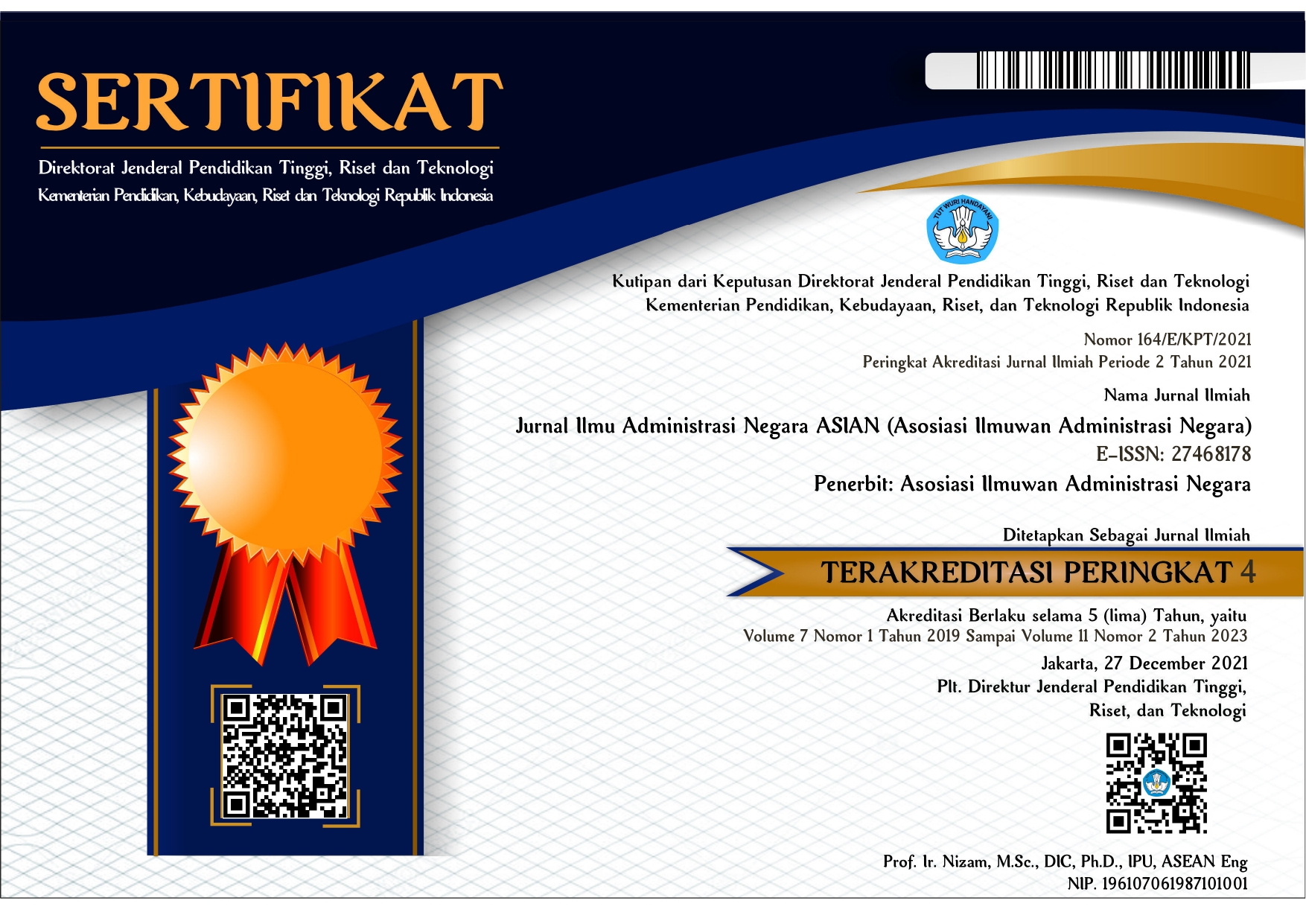Building Capacity dalam Pendidikan Anti Korupsi
Studi : Kebijakan Kurikulum Dinas Pendidikan Di Provinsi Aceh
 Abstract views: 482
,
Abstract views: 482
,
 PDF downloads: 1136
PDF downloads: 1136
Abstract
An educational institution's success depends on its anti-corruption approach. This study's goal is to explain how the Corruption Eradication Commission's (KPK) strategy can be used to incorporate anti-corruption values into the academic curriculum. This study employs library research, which is research whose research objectives are discovered using a variety of library information (books, encyclopedias, scientific journals, newspapers, magazines, and documents). According to the study, the Corruption Eradication Commission's (KPK) achievement in preventing and harshly punishing corrupt individuals on Indonesian soil is evidence of the effectiveness of the anti-corruption policy. Several alternative models that can be used to instill anti-corruption values in schools include models as separate subjects, integrated models in all subjects, models outside of the classroom, models of culture and habituation of values in all school activities and atmosphere, and finally the combined model.
Downloads
References
Adejumo, O. O., Asongu, S. A., & Adejumo, A. V. (2021). Education enrolment rate vs employment rate: Implications for sustainable human capital development in Nigeria. International Journal of Educational Development, 83(March 2020), 102385. https://doi.org/10.1016/j.ijedudev.2021.102385
Ani, U. D., Watson, J. M. K., Carr, M., Cook, A., & Nurse, J. R. C. (2020). A review of the use and utility of industrial network-based open source simulators: functionality, security, and policy viewpoints. Journal of Defense Modeling and Simulation, 11–20. https://doi.org/10.1177/1548512920953499
Banerjee, R., Boly, A., & Gillanders, R. (2020). Anti-Tax Evasion, Anti-Corruption and Public Good Provision: An Experimental Analysis of Policy Spillovers. SSRN Electronic Journal, July, 1–32. https://doi.org/10.2139/ssrn.3652411
Becker, F. G., Cleary, M., Team, R. M., Holtermann, H., The, D., Agenda, N., Science, P., Sk, S. K., Hinnebusch, R., Hinnebusch A, R., Rabinovich, I., Olmert, Y., Uld, D. Q. G. L. Q., Ri, W. K. H. U., Lq, V., Frxqwu, W. K. H., Zklfk, E., Edvhg, L. V, Wkh, R. Q., … فاطمی, ح. (2015). No 主観的健康感を中心とした在宅高齢者における 健康関連指標に関する共分散構造分析Title. Syria Studies, 7(1), 37–72. https://www.researchgate.net/publication/269107473_What_is_governance/link/548173090cf22525dcb61443/download%0Ahttp://www.econ.upf.edu/~reynal/Civil wars_12December2010.pdf%0Ahttps://think-asia.org/handle/11540/8282%0Ahttps://www.jstor.org/stable/41857625
Biesta, G., Allan, J., & Edwards, R. (2011). The Theory Question in Research Capacity Building in Education: Towards an Agenda for Research and Practice. British Journal of Educational Studies, 59(3), 225–239. https://doi.org/10.1080/00071005.2011.599793
Birkland, T. A. (2015). An introduction to the policy process: Theories, concepts, and models of public policy making: Fourth edition. In An Introduction to the Policy Process: Theories, Concepts, and Models of Public Policy Making: Fourth Edition. https://doi.org/10.4324/9781315717371
Boucher, A. (2017). Boundary spanning regimes and public policy change: the convergence of welfare and immigration policies. Australian Journal of Political Science, 52(1), 19–36. https://doi.org/10.1080/10361146.2016.1260682
Chaskin, R. J. (2000). Building community capacity: A definitional framework and case studies from a comprehensive community initiative. Urban Affairs Review, 36(3), 291–323. https://doi.org/10.1177/10780870122184876
Godakandage, S. S. P., Senarath, U., Jayawickrama, H. S., Siriwardena, I., Wickramasinghe, S. W. A. D. A., Arumapperuma, P., Ihalagama, S., Nimalan, S., Archchuna, R., Umesh, C., Uddin, S., & Thow, A. M. (2017). Policy and stakeholder analysis of infant and young child feeding programmes in Sri Lanka. BMC Public Health, 17(Suppl 2). https://doi.org/10.1186/s12889-017-4342-4
Hambali, G. (2020). Evaluasi program pendidikan antikorupsi dalam pembelajaran. Integritas: Jurnal Antikorupsi Komisi Pemberantasan Korupsi, 6(1), 31–45. https://doi.org/10.32697/integritasv6i1.621
Pengadilan Negeri Banda Aceh. (2019). SURVEI PERSEPS I KORUPSI 2019.
Piocos, C. M., Vilog, R. B. T., & Bernadas, J. M. A. C. (2022). Interpersonal Ties and Health Care: Examining the Social Networks of Filipino Migrant Domestic Workers in Hong Kong. Journal of Population and Social Studies, 30, 86–102. https://doi.org/10.25133/JPSSv302022.006
Soti-Ulberg, C., Hromi-Fiedler, A., Hawley, N. L., Naseri, T., Manuele-Magele, A., Ah-Ching, J., Pérez-Escamilla, R., Sanele, M., Maualaivao, N. T., Faaleaga, V., Aiolupotea, S., Abraham, J. A., Tuautu, S., Tamati, C., Lesatele, P., Harris, N., Moala, S., Leleimalefaga, S. U., Faleupolu, L., … Atoa, C. (2020). Scaling up breastfeeding policy and programs in Samoa: Application of the Becoming Breastfeeding Friendly initiative. International Breastfeeding Journal, 15(1), 1–10. https://doi.org/10.1186/s13006-019-0245-6
Spoth, R., Greenberg, M., Bierman, K., & Redmond, C. (2004). PROSPER community-university partnership model for public education systems: Capacity-building for evidence-based, competence-building prevention. Prevention Science, 5(1), 31–39. https://doi.org/10.1023/B:PREV.0000013979.52796.8b
Suyadi, S., Nuryana, Z., & Sutrisno, S. (2021). The religion in higher education curriculum referring to Indonesian qualification framework: The inclusion of neuroscience and anti-corruption education. International Journal of Education and Learning, 3(1), 38–44. https://doi.org/10.31763/ijele.v3i1.93
Teehankee, J. C., & Thompson, M. R. (2016). Electing A Strongman. Journal of Democracy, 27(4), 125–134. https://doi.org/10.1353/jod.2016.0068
Yang, L. (2017). Types and Institutional Design Principles of Collaborative Governance in a Strong-Government Society: The Case Study of Desertification Control in Northern China. International Public Management Journal, 20(4), 586–623. https://doi.org/10.1080/10967494.2016.1141812
Copyright (c) 2022 Jurnal Ilmu Administrasi Negara ASIAN (Asosiasi Ilmuwan Administrasi Negara)

This work is licensed under a Creative Commons Attribution-ShareAlike 4.0 International License.
Authors who publish with this journal agree to the following terms:
1. Copyright on any article is retained by the author(s).
2. The author grants the journal, right of first publication with the work simultaneously licensed under a Creative Commons Attribution License that allows others to share the work with an acknowledgment of the work’s authorship and initial publication in this journal.
3. Authors are able to enter into separate, additional contractual arrangements for the non-exclusive distribution of the journal’s published version of the work (e.g., post it to an institutional repository or publish it in a book), with an acknowledgment of its initial publication in this journal.
4. Authors are permitted and encouraged to post their work online (e.g., in institutional repositories or on their website) prior to and during the submission process, as it can lead to productive exchanges, as well as earlier and greater citation of published work.
5. The article and any associated published material is distributed under the Creative Commons Attribution-ShareAlike 4.0 International License








